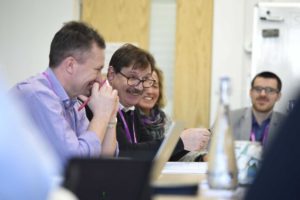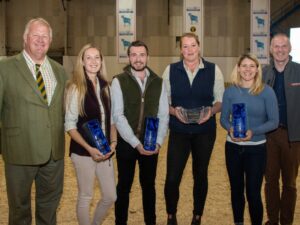 International agri-businesses, scientists and researchers have committed to working together to answer some of the biggest challenges facing global food security. From boosting sustainable food production in Africa to using data to drive efficiencies in UK farming, each new collaboration to be developed hopes to deliver real benefits on the ground.
International agri-businesses, scientists and researchers have committed to working together to answer some of the biggest challenges facing global food security. From boosting sustainable food production in Africa to using data to drive efficiencies in UK farming, each new collaboration to be developed hopes to deliver real benefits on the ground.
The new partnerships were fostered by the Rothamsted Open Innovation Forum, held in Hertfordshire from 18-20 January. Attended by around 250 delegates from leading European markets and as far afield as Pakistan, Australia, South Africa, Singapore and America, the forum included a series of workshops to help solve some of the key problems identified by industry leaders.
“Unlike conventional conferences, the Rothamsted Open Innovation Forum was aimed at helping to take those ideas forward into multi partner collaborations that really deliver in practice,” says Bianca Forte, Alliance Manager at Rothamsted Research. “We are offering our conferencing facilities free of charge to those teams, and hope to nurture any resulting business start-ups or research ventures on-site under our Agritech Research Innovation Accelerator Programme.”
Leading the project to boost sustainable food production in Africa will be Prof Steve McGrath, Head of Sustainable Soil and Grassland Systems at Rothamsted Research. Partners include the Bill and Melinda Gates Foundation, who will work to identify suitable areas on which to intensify agriculture and support local farmers in raising productivity.
Jon Timmis; Professor of Intelligent and Adaptive Systems at York University, and Sarah Targett; Data Workflow Support Manager at Syngenta, will head up a project on sharing agricultural data to boost global biodiversity. “Every second we lose a soccer field of farmland to desertification, urbanisation and degradation,” warns Dr Targett. By sharing data and computer modelling, they hope to better co-ordinate activities to connect biodiverse areas and generate cumulative benefits.
Syngenta is also involved in a second opportunity, looking at how to improve data sharing between farmers and related industries, and manage security across different platforms. “Boosting farmer confidence in security and data management will be critical to unlocking the potential that technology holds,” says Syngenta’s Science and Technology Fellow Derek Scuffell, who is leading the project.
A key challenge for many farmers and scientists is securing social acceptance for crop protection technologies. Headed by Bernard Leroux, Head of Research and Development at Bayer, this team will consider how to improve consumer understanding of new technological improvements and the benefits it can bring to wider society. “There is a public recognition of the link between science and medicine but not between science and agriculture,” he says. “We need to address that, as agricultural science will be needed more in the future.”
Science may also be the key to unlocking improved yields with lower inputs, says Matthew Ryan, Curator of the Genetic Resource Collection at the Centre for Agriculture and Biosciences International (CABI). He is bringing together an international team to develop understanding of the plant microbiome, leading to enhanced crop health and productivity.
“Open Innovation is all about partnerships,” says Angela Karp, Director of Science Innovation, Engagement and Partnership at Rothamsted Research. “There is a real need for us to pull together to tackle some of these big issues. We need a strategy and an action plan, and we are delighted that ROIF has helped to facilitate this.”
ROIF 2018 will examine the success of each project, explore lessons learned, and consider new challenges to address going forward. Provisional dates are 17-19 January 2018.
For more information, visit roif.co.uk.



